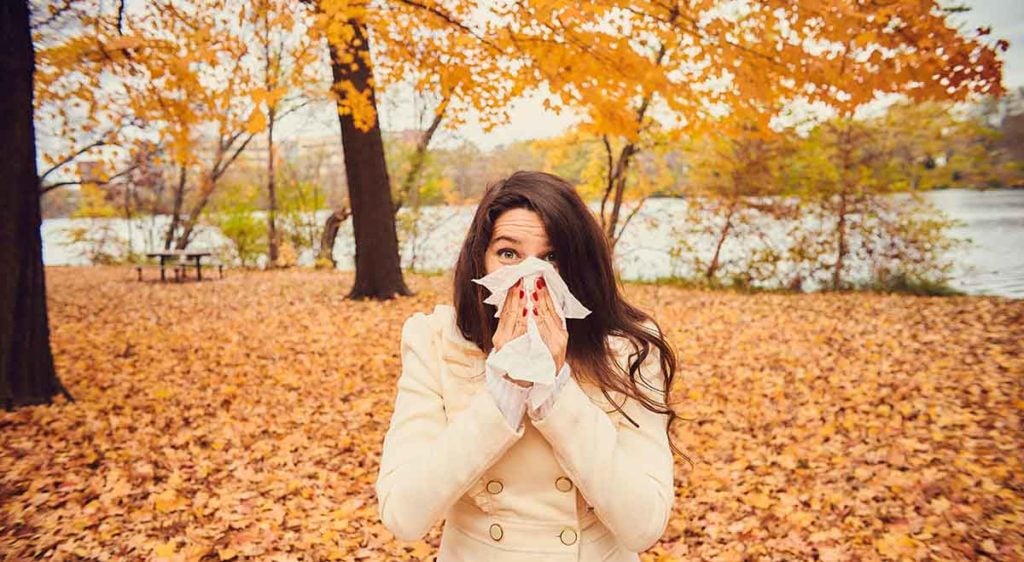Allergy season is winding down, but that doesn’t mean we’ll be saying goodbye to allergies for the rest of the year. Fall brings new allergens like ragweed pollen along with dust mite and food allergies which are year-round. Fall allergy triggers are different but can cause just as many symptoms as in spring and summer. These symptoms include:
- Runny nose
- Watery eyes
- Sneezing
- Coughing
- Itchy eyes and nose
- Dark circles under the eyes
As we prepare for students to return back to school, it’s important to understand these triggers and how to treat them this season.
Ragweed Pollen Allergy
Ragweed is the biggest allergy trigger in the fall. Ragweed starts to release pollen in August and can last into September and October. About 75% of people allergic to spring plants also have reactions to ragweed. Ragweed pollen can travel hundreds of miles and affect certain fruits and vegetables. For people who are allergic to ragweed, bananas, melon, and zucchini can cause allergy symptoms.
We recommend visiting an allergist to determine if you are allergic to ragweed. The NY Allergy & Sinus Centers allergists quickly diagnose your allergies and provide you with a full treatment plan. Ask us about allergy shots to help you feel better all season.
Dust Mite Allergy
Going back to school brings fall allergies in kids because dust mites are common in schools. Dust mites are tiny, insect-like pests that feed on dead human skin cells and thrive in warm, humid settings. Moist or humid places, such as furnaces and air filters, are common hiding spots for dust mites. While you may not be able to control this at school, there are ways to reduce dust mites at home.
- Always insert a clean air filter before turning on your furnace at the beginning of the season to help mitigate indoor allergies through fall and winter.
- Vacuum often with HEPA filters if you have carpet.
- Wash bedding in hot water at least once a week.
Food Allergy
Food allergies occur year-round, but we see a lot of serious allergic reactions in fall. With new younger students going to school, they may experience an allergic reaction for the first time away from home. Some states have formal policies or guidelines to improve the management of food allergies in schools, but most of them do not. Systematic planning for managing the risk of food allergies and responding to food allergy emergencies in schools and ECE programs remains incomplete and inconsistent (Centers for Disease Control and Prevention).
Since there still isn’t a cure for food allergies, be sure to send your allergic kids to school with 2 EpiPens each day. You may not be able to rely on the school’s supply of epinephrine. If you need a new prescription or refill, our allergists are always proud to accept new pediatric patients. We also train you and your family on how to safely deliver epinephrine. Call (212) 686-6321 to learn more or schedule an appointment online.
Meet the Physician Collaborator
Dr. Shah is a board-certified physician specializing in Adult & Pediatric allergy & immunology. She completed her undergraduate degree in Biology with a concentration in pre-medical from the University of North Carolina at Charlotte. While she was getting her undergraduate degree, she was commended to the Dean’s list and graduated with University honors. She was also recognized in the Beta Beta Beta, a National Biological Honors Society. Dr. Shah completed medical School in Atlanta, GA where she was recognized as a member of Sigma Sigma Phi, an Honorary Fraternity. She then did her Internal Medicine Residency at Jefferson Health System of NJ. She received her degree in Allergy & Immunology from Nova Southeastern University in Miami, Florida. Dr. Shah has been involved in research since her undergraduate days and is very well published. She has authored and co-authored multiple journal articles. Dr. Shah is also a corresponding author of the Allergy & Immunology board-review books which are read by all physicians certifying and re-certifying for the Allergy & immunology boards.

